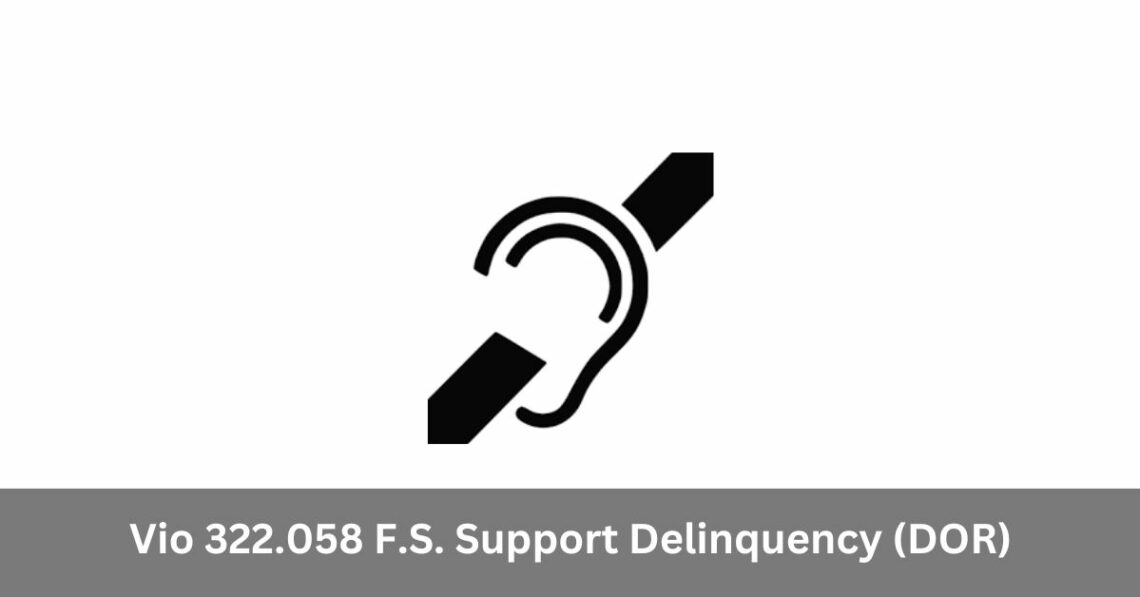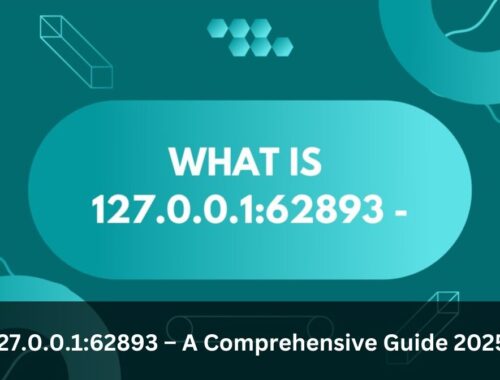
Vio 322.058 F.S. Support Delinquency (DOR) – Updated In 2024
Have you ever wondered how VIO 322.058 F.S. Support Delinquency (DOR) could impact support delinquency cases in Florida, and what role the Department of Revenue truly plays in enforcing support orders?
VIO 322.058 F.S. Support Delinquency (DOR) is a statute within the legal framework of Florida that addresses support delinquency matters. It pertains to the enforcement of court-ordered support payments, specifically concerning cases where there is a failure to comply with these obligations.
Let’s Delve into the Depth of VIO 322.058 F.S.Support Delinquency (DOR) with all features;
Table of Contents
Understanding VIO 322.058 F.S. Support Delinquency (DOR
In the realm of family law, compliance with court-ordered support payments is imperative to ensure the well-being of dependents. VIO 322.058 F.S Support Delinquency (DOR) is a statute within the legal framework of Florida, specifically addressing support delinquency matters.
Under this statute, the Department of Revenue (DOR) plays a crucial role in enforcing support obligations and upholding the integrity of court-issued directives.
VIO 322.058 F.S. Support Delinquency (DOR) encompasses the legal statutes governing support delinquency in Florida. It outlines the rights and responsibilities of both parties involved in support orders, emphasizing the importance of timely and consistent payments to meet the needs of dependents.
Support delinquency refers to the failure of an individual to meet their court-ordered obligations for child support or alimony payments. This can result in significant financial strain on custodial parents and have adverse effects on the well-being of children.
Overview of VIO 322.058 F.S. Support Delinquency (DOR): Let’s Explore
VIO 322.058 F.S. Support Delinquency (DOR) delineates the legal parameters surrounding support delinquency in the state of Florida. It establishes guidelines for both obligors and obligees, emphasizing the importance of fulfilling support obligations promptly. The statute aims to safeguard the rights of dependents by ensuring that they receive the financial support they are entitled.
Support delinquency is a significant issue that can have far-reaching implications for families and children. When individuals fail to comply with court-ordered support payments, it can lead to financial instability and emotional distress for those reliant on such support. The Department of Revenue (DOR) serves as a critical entity in addressing support delinquency, working diligently to enforce compliance and uphold the welfare of dependents.
Roles and Responsibilities of Government Agencies: Understanding The Basic Concept
Government agencies, including the Department of Revenue (DOR), are entrusted with the task of enforcing support orders and ensuring that obligors fulfill their financial obligations.

Through various enforcement mechanisms, such as wage garnishment and asset seizure, these agencies strive to hold delinquent individuals accountable and facilitate the disbursement of support payments to deserving recipients.
Despite concerted efforts to enforce support orders, numerous challenges and impediments can hinder the process. Non-compliance from obligors, legal complexities, and difficulties in locating individuals can pose significant barriers to effective enforcement. Additionally, navigating the legal landscape surrounding support delinquency can be intricate and time-consuming.
Consequences of Non-Compliance: Discussing Results
Here are some key results of non-compliance:
Legal Penalties: Delinquent individuals may face legal penalties for failing to comply with support orders. These penalties can include fines, court fees, and other punitive measures imposed by the court.
Suspension of Driver’s Licenses: In some cases, non-compliance with support orders can result in the suspension of the delinquent individual’s driver’s license. This measure is intended to incentivize compliance by imposing additional consequences for failure to fulfill support obligations.
Asset Seizure: The court may order the seizure of assets belonging to the delinquent individual as a means of enforcing compliance with support orders. This can include bank accounts, property, and other assets that may be liquidated to satisfy outstanding support payments.
Contempt of Court: Non-compliance with support orders can also result in contempt of court charges against the delinquent individual. Contempt of court is a serious offense that can carry additional penalties, including fines, community service, and even imprisonment.
Garnishment of Wages: One common enforcement mechanism used to compel compliance with support orders is wage garnishment. This involves the automatic deduction of a portion of the delinquent individual’s wages or income to satisfy outstanding support payments.
Support Systems and Resources: Dive Into Information
For individuals grappling with support delinquency issues, various support systems and resources are available to assist.
Government agencies and community organizations offer mediation services, financial counseling, and legal aid to help navigate the complexities of support enforcement. These resources serve as invaluable tools in facilitating compliance and addressing challenges associated with support delinquency.
Preventative measures play a crucial role in mitigating support delinquency. Education and awareness campaigns can enlighten individuals about their rights and responsibilities, as outlined in VIO 322.058 F.S Support Delinquency (DOR). By fostering a better understanding of the consequences of non-compliance, these initiatives seek to promote adherence to support orders and prevent delinquency before it occurs.
Legal Rights and Recourse: Click To Get Information
Understanding one’s legal rights and recourse is essential for navigating support delinquency matters effectively. Both obligors and obligees have rights under the law, and seeking legal counsel can provide clarity and guidance in addressing support-related issues.
Legal professionals can offer invaluable assistance in advocating for the enforcement of support orders and protecting the interests of dependents. In complex support delinquency cases, seeking legal counsel is often advisable to navigate the legal intricacies and ensure that one’s rights are protected. Legal professionals can provide valuable guidance and representation throughout the enforcement process.
Community Engagement and Advocacy: Communal Relationships
Community engagement and advocacy are essential components of communal relationships. When individuals and groups actively participate in community initiatives and advocate for positive change, they foster a sense of belonging and interconnectedness within the community.
Through collaborative efforts, community members can address shared challenges, advocate for equitable policies, and create a supportive environment for all. By engaging in dialogue, promoting inclusivity, and working towards common goals, communal relationships are strengthened, leading to a more resilient and thriving community for everyone involved.
Prevention Strategies: Steps Which Must Be Followed In VIO 322.058 F.S. Support Delinquency (DOR)
Community engagement and advocacy efforts play a vital role in raising awareness about support delinquency issues and advocating for systemic reforms.

Through collaborative endeavors between government agencies, community organizations, and advocacy groups, stakeholders can work towards enhancing support enforcement policies and ensuring equitable outcomes for all parties involved.
Future Trends and Considerations: Upcoming Features VIO 322.058 F.S. Support Delinquency (DOR)
The landscape of support delinquency enforcement is dynamic, with emerging trends and considerations shaping the way forward. As societal dynamics evolve and legislative frameworks adapt, it is imperative to stay abreast of these developments and proactively address emerging challenges. By embracing innovation and collaboration, stakeholders can forge a path towards more effective support enforcement mechanisms and improved outcomes for families and children.
Some of the upcoming features to watch out for include:
Technological Advancements: With the advancement of technology, there is a growing emphasis on leveraging digital tools and platforms to streamline support enforcement processes. This may include the implementation of online payment portals, electronic monitoring systems, and data analytics tools to enhance efficiency and accuracy in tracking support payments.
Enhanced Collaboration: Recognizing the interconnected nature of support delinquency issues, there is a growing trend towards enhanced collaboration between government agencies, community organizations, and other stakeholders. By fostering greater coordination and information-sharing, stakeholders can work together more effectively to address support delinquency and improve outcomes for families and children.
Legislative Reforms: As societal dynamics evolve, there may be legislative reforms aimed at modernizing and strengthening support enforcement laws. These reforms may include updates to existing statutes, introduction of new enforcement mechanisms, and measures to address emerging challenges such as non-traditional family structures and interstate support enforcement.
Focus on Prevention: In addition to enforcement efforts, there is a growing recognition of the importance of preventive measures in addressing support delinquency. Future trends may involve greater investment in education and outreach programs aimed at raising awareness about support obligations, promoting financial literacy, and providing resources to help individuals fulfill their support obligations proactively.
Data-driven Decision-Making: With the increasing availability of data and analytics tools, there is a shift towards data-driven decision-making in support of enforcement efforts. By analyzing trends, patterns, and outcomes, policymakers and practitioners can identify areas for improvement, allocate resources more effectively, and develop targeted interventions to address support delinquency more efficiently.
Conclusion of Vio 322.058 F.S. Support Delinquency (DOR):
In conclusion, VIO 322.058 F.S. Support Delinquency (DOR) serves as a cornerstone in addressing support delinquency issues in the state of Florida.
Through the diligent efforts of government agencies, community organizations, and legal professionals, strides are being made to enforce support orders and uphold the rights of dependents. By fostering collaboration, promoting awareness, and advocating for systemic reforms, stakeholders can work towards a future where support delinquency is minimized, and the welfare of families and children is safeguarded.
You May Also Like

Introducing Spanks – Detailed Fully In Depth Guide In 2024
February 15, 2024
127.0.0.1:62893 – A Comprehensive Guide 2025!
March 7, 2025

Average Rating